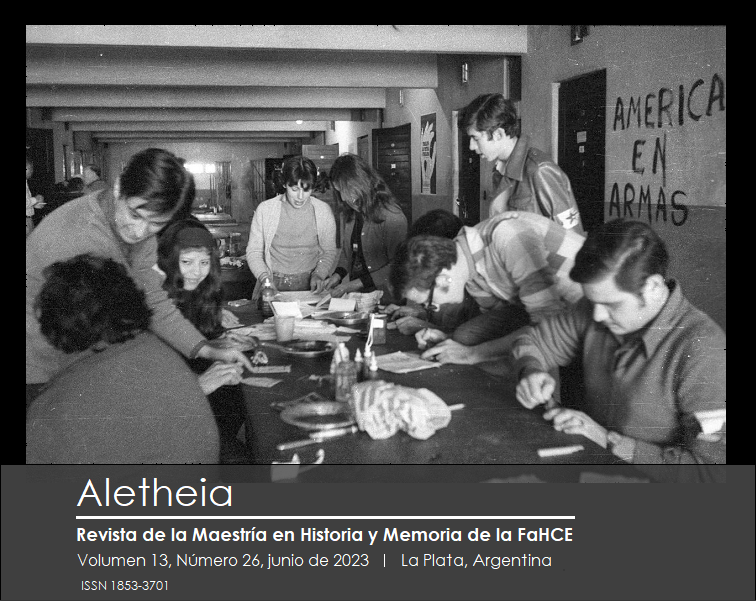Maternity and Political Action: tensions and strategies of women opponents of the Civic- Military Dictatorship in Iquique (1973-1989)
Main Article Content
Abstract
During the Chilean military dictatorship, different social sectors mobilized against the regime, with women being an important group in the anti-dictatorial struggle present in multiple organizational spaces. This article aims to analyze from a critical perspective and gender approach, different trajectories of activism of women mothers opposed to the regime in the city of Iquique, seeking to highlight the tensions between the traditional conception of motherhood present both in the public discourse of the dictatorship and at the social level, with the ways of assuming political participation from being mothers. As a hypothesis, the discourses around the ideal of motherhood disputed the senses and self-perception of women activists, and although the role of mothers did not operate as a limitation to their socio-political participation, It did pass through their experiences and was a factor that shaped the forms of participation, dedication times and roles they took on in organizations. The methodology included qualitative analysis of oral sources, written press, speeches and documents issued by the Military Council, as well as bibliographic review. At the theoretical level, we worked from the social history, the history of the present time and the gender history.
Downloads
Article Details

This work is licensed under a Creative Commons Attribution-NonCommercial-ShareAlike 4.0 International License.
This work is licensed under a Creative Commons Attribution 4.0 International (https://creativecommons.org/licenses/by-nc-sa/4.0/deed.es).
References
Álvarez, V. y Laino, F. (2020). Maternidades en cautiverio. Experiencias de maternidad, embarazo y parto en centros clandestinos de detención durante la última dictadura militar argentina. Mora, 26(1). Recuperado de http://www.scielo.org.ar/scielo.php?pid=S1853-001X2020000100001&script=sci_arttext DOI: https://doi.org/10.34096/mora.n26.10082
Castro, A. (2021). La delgada línea roja. Historia y resignificación del actuar de la Cruz Roja Chilena (Tesis de grado inédita). Santiago: Universidad de Chile.
Cerda, K. (2023). Experiencias de resistencia y organización de mujeres opositoras a la dictadura militar en Iquique (1973-1989). Diálogo Andino, Revista de Historia, Geografía y Cultura Andina, 70.
Gálvez, A. (Coord.) (2021). Históricas. Movimientos feministas y de mujeres en Chile, 1850-2020. Santiago: Lom Ediciones.
Lo, D., Cerda, K., Zarricueta, D. y Rojas, R. (2022). Vocación y beneficencia: un siglo de historia en el edificio de la Cruz Roja de Iquique. Iquique: Editorial Pájaro en Mano.
Luna, L. (1994). Lo político del género en América Latina. Isis, Ediciones de la Mujer, 21, 19-33.
Maravall, J. (2004). El ideario de mujer bajo la dictadura militar (1973-1990). Pensamiento Crítico. Revista Electrónica de Historia, 4, 1-19.
Meneses, J. (2013). Trabajo Social y Compromiso Político. Santiago: Universidad Academia de Humanismo Cristiano.
Palestro, S. (1991). Mujeres en movimiento 1973-1989. Santiago: FLACSO (Serie Estudios Sociales, 14).
Peñaloza, C. (2015). Duelo callejero: mujeres, política y derechos humanos durante la dictadura chilena (1973-1989). Estudos feministas, 23(3), 959-973. DOI: https://doi.org/10.1590/0104-026X2015v23n3p959
Pérez, E. (2021). La identidad de la mujer. Una Cuestión Existencialista. Bajo la Mirada de Simone de Beauvoir (Tesis de grado inédita). Universidad de Sevilla, España. Recuperada de https://idus.us.es/bitstream/handle/11441/131670/TFG_FUENTES%20PEREZ%2c%20ESPERANZA%20M._JUN_20-21.pdf?sequence=1&isAllowed=y
Sepúlveda, F. (2014). La mujer como bastión de la Reconstrucción Nacional: representaciones sociales presentes en El Mercurio, 1973-1979. Contextos, 31, 95-110.
Tessada, V. (2010). La Secretaría Nacional de la Mujer y la Sección Femenina. Ecos hispanistas en la dictadura militar chilena (1973-1990). CUADERNOS KÓRE, 1(3), 62-70. Recuperado de https://e-revistas.uc3m.es/index.php/CK/article/view/1212
Trias, M. (2023). Presas políticas, pero madres. El uso de la maternidad como mecanismo de tortura en contexto de prisión política, Uruguay 1970-1978. Encuentros Uruguayos, 16(1), 1-20. DOI: https://doi.org/10.59842/16.1.3
Vidaurrázaga, T., Ruiz, M. y Ruiz, M. (2020). Compórtate como una mujer. La tortura genérico-sexual como dispositivo de control dictatorial en Chile y Uruguay. Clepsidra. Revista Interdisciplinaria de Estudios sobre Memoria, 7(14), 28-47. Recuperado de http://ppct.caicyt.gov.ar/index.php/clepsidra/article/view/VIDAURRAZAGA
